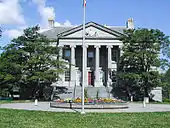23rd General Assembly of Newfoundland | |
|---|---|
 Colonial Building seat of the Newfoundland government and the House of Assembly from January 28, 1850, to July 28, 1959. | |
| History | |
| Founded | 1914 |
| Disbanded | 1919 |
| Preceded by | 22nd General Assembly of Newfoundland |
| Succeeded by | 24th General Assembly of Newfoundland |
| Leadership | |
Premier | Edward P. Morris (until December 1917) |
Premier | William F. Lloyd (until May 1919) |
Premier | |
| Elections | |
Last election | 1913 Newfoundland general election |
The members of the 23rd General Assembly of Newfoundland were elected in the Newfoundland general election held in October 1913. The general assembly sat from 1914 to 1919.[1]
The Newfoundland People's Party led by Edward P. Morris formed the government.[2] The Liberal Party and the Fishermen's Protective Union joined in a coalition which sat in opposition to the government. In July 1917, a National Government was formed with Morris as leader; the cabinet contained representatives from all three parties. Morris resigned from the assembly in late December 1917 when he was named to the British House of Lords. William F. Lloyd became Premier and leader of the National Government in January 1918.[3]
Because of World War I, the general election which would normally have occurred in 1917 was delayed by a year.[1] In 1918, legislation was passed extending the life of the assembly by another year. The Lloyd government was brought down by a vote of no confidence in May 1919. Michael P. Cashin was asked by Governor Harris to form a government which remained in power until the general election scheduled later in 1919.[3]
John R. Goodison served as speaker until 1918 when William J. Higgins succeeded Goodison as speaker.[4]
Sir Walter Edward Davidson served as governor of Newfoundland until 1917.[5] Sir Charles Alexander Harris succeeded Davidson as governor.[6]
The Military Services Act was passed in May 1918 to allow for the conscription of unmarried men between the ages of 19 and 40 to replace losses from the Newfoundland Regiment during the first World War. However, the war ended before any of these new soldiers reached the front.[7]
Members of the Assembly
The following members were elected to the assembly in 1913:[1]
Notes:
By-elections
By-elections were held to replace members for various reasons:
| Electoral district | Member elected | Affiliation | Election date | Reason |
|---|---|---|---|---|
| Twillingate | William F. Coaker[nb 1] | Fishermen's Protective Union | November 26, 1914 | R Bond resigned his seat January 14, 1914[1] |
| Bonavista | Alfred B. Morine[nb 1] | Fishermen's Protective Union | November 26, 1914 | WF Coaker resigned his seat to contest Twillingate[1] |
Notes:
References
- 1 2 3 4 5 "Elections". Encyclopedia of Newfoundland and Labrador. pp. 707–09.
- ↑ Hiller, JK (15 December 2013). "Morris, Edward Patrick, 1st Baron Morris". Canadian Encyclopedia (online ed.). Historica Canada.
- 1 2 Baker, Melvin (1994). "The Rise of the Fishermen's Protective Union, the First World War and the National Government, 1908-1919". Memorial University.
- ↑ "The Speaker of the House of Assembly". House of Assembly. Archived from the original on 2009-10-13.
- ↑ "Davidson, Sir Walter Edward (1859-1923)". Newfoundland and Labrador Heritage. Memorial University.
- ↑ "Harris, Sir Charles Alexander (1855-1947)". Newfoundland and Labrador Heritage. Memorial University.
- ↑ "The Newfoundland Regiment and the Great War". The Rooms Corporation of Newfoundland and Labrador. Archived from the original on 2015-01-05. Retrieved 2015-04-04.